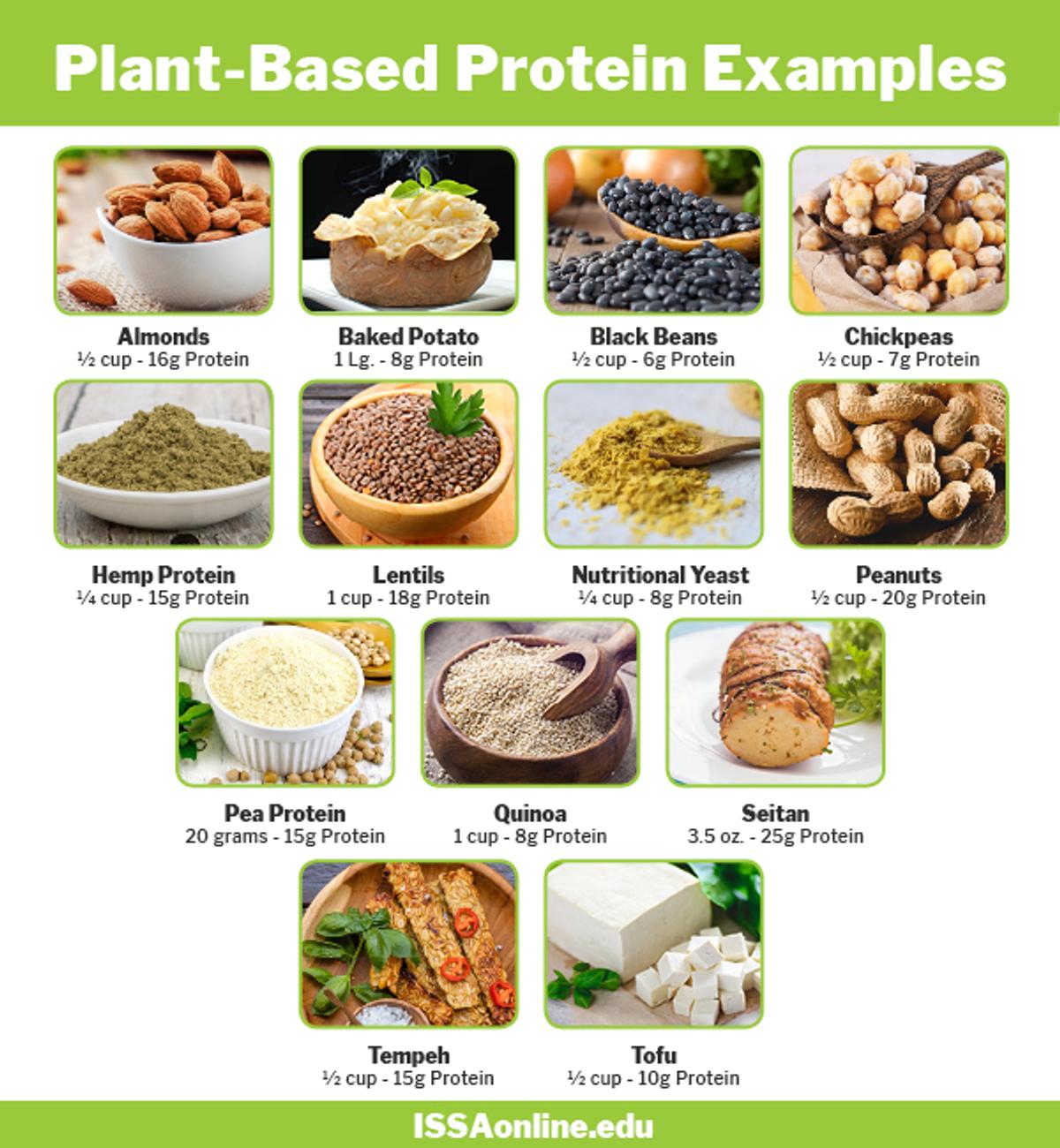
Plant-Based Protein: Exploring Options Beyond Chicken
Reading Time: 4 minutes
BY: ISSA
DATE: 2019-03-28
Many people get their daily supply of protein through varying forms of meat and other animal products: chicken, steak, fish, eggs, and dairy. However, vegans, vegetarians, or anyone who chooses to limit the amount of meat or other animal products they eat, must look to plants for their protein sources. If you or your clients follow a plant-based diet or are even looking for variety in a diet that includes animal products, it's helpful to know there are plenty of protein options beyond the go-to animal sources.
The Essentials: Protein and Amino Acids
Switching to a plant-based diet can have its health benefits, but it is still important to make sure your clients are getting everything they need. In particular, the proper amount of protein. Proteins are one of the three macronutrients—along with carbs and fats—that are essential to the human diet. Macronutrients influence appetite and the sense of being full, energy levels, and the ability to recover from exercise.
A mixture of 21 amino acids makes up proteins. The body produces 12 of those on its own; the other nine are known as essential amino acids and must come from food. The human body cannot function without a diet rich in essential amino acids. Proteins vary in the number of amino acids they provide, with animal protein ranking higher than plant protein. A plant-based diet should include a variety of foods to ensure consumption of the right amount of amino acids.
Plant-Based Protein Sources
A large variety of plants provide protein, and not just in tiny amounts. From grains to leafy greens, you have options that pack a punch and can help keep your clients' diets in top form.
Nuts, seeds, and legumes are excellent sources of plant-based protein and serves as ingredients in an array of plant-based eating options. Almonds make a great snack on their own, added to a salad, or as almond butter. Chia seeds can be sprinkled on just about anything: salads, smoothies, oatmeal, etc. Beans, when combines with rice, form a complete protein. Chickpeas are great when tossed with spices and eaten whole, turned into hummus, or when added to soups or curries. Lentils make a great ingredient in both soups and salads.
Vegetables are no slouch either. Spinach, sprouts, broccoli, cauliflower, and asparagus are easy options for sneaking in an extra source of protein without the extra calories. These foods also bring with them a variety of vitamins and other nutrients to create a well-rounded, healthy diet.
Soybeans are a complete protein, containing all nine essential amino acids. Common soybean products include edamame, tofu, and tempeh.
Edamame, which are immature soybeans, are commonly boiled or steamed before eaten. They're a popular addition to salads and soups.
Tofu, made from the bean curds, is often the first meat substitute that comes to mind.
Tempeh is cooked, fermented soybeans formed into a patty. It is rich in protein, fiber, and vitamins.
Seitan, also known as wheat protein, does not contain soy. It is high in protein and low in calories, making it a popular meat substitute. However, it does contain gluten, which causes some people to steer away from it. Most people buy seitan at a grocery store rather than making it themselves, so caution your clients that it can be highly processed and contain high levels of sodium.
Nutritional yeast, a deactivated yeast, functions as a non-dairy cheese substitute. Your clients can mix nutritional yeast into mashed potatoes, use it to make a vegan cheese sauce, sprinkle it on popcorn, and more. Fortified nutritional yeast also packs in extra nutrients such as zinc, magnesium, and B vitamins.
Plant-Based Protein Powders
Protein powder is a popular way to supplement the diet, especially for active individuals such as your clients. If your client opts for plant-based protein powders there are several options out there to help them meet their needs.
Pea Protein Powder
Pea protein, which is gluten-free and dairy-free, is becoming increasingly popular plant-based protein. Plus, it does not contain many of the other common food allergens such as fish, shellfish, peanuts, eggs, or soy. Pea protein contains high levels of L-arginine, an amino acid that helps build muscle. The powder, made by grinding the peas into a powder and then removing the starch and fiber, is most commonly added to smoothies and shakes.
Hemp Protein Powder
Hemp protein, made from ground hemp seeds, contains all nine essential amino acids. As a complete protein option, it is a great source of plant-based protein. Hemp protein is one of the less processed plant-based protein powders, making it more desirable for some people. Additionally, hemp protein is a high-fiber option, generally containing 8 grams of fiber per serving.
Rice-Based Protein Powder
While not as popular as pea or hemp protein, rice protein is another plant-based protein option. Rice protein comes from brown rice treated with certain enzymes that separate the protein from the carbohydrates. It doesn't contain all of the essential amino acids as it is too low in lysine, so other proteins are often added, such as chia seeds or quinoa.
While it takes a very heavy protein intake to be "too much," deficiencies in protein are also very rare, even for those passing on animal products. However, for your clients burning through the extra energy at the gym, maintaining a healthy diet with beneficial amounts of protein can take some planning. Help them make the most of their food choices with these options for plant-based protein. A diet rich in variety and nutrients can help support long-term goals and success.
Do you believe diet is a key factor in helping clients accomplish their long-term health and fitness goals? Check out the ISSA's nutrition course online so you can help clients achieve their best self.

Click HERE to download this handout and share with your clients!